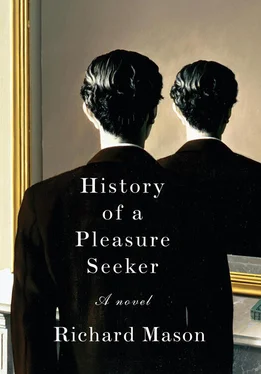It was rare for a rival to challenge Constance directly. When one did they discovered that Louisa Vermeulen-Sickerts, generally so silent, was capable of devastating sarcasm and quite prepared to unleash it on her sister’s behalf. Louisa’s maxim was: “Those who laugh are always right.” She was very good at ensuring that people laughed with the sisters, not against them.
Men grew sleepless and erratic over Constance, and she had already (so the newspapers said) received and rejected eighteen offers of marriage, as against three for the glacial Louisa. This discrepancy made no difference to the girls’ friendship, which was devoted and tender. This was partly because Louisa discouraged all suitors, finding none to her taste, while her sister took satisfaction from quantity as well as quality.
Constance kept her paramours in the state of consuming desire that cannot long survive its fulfillment. She had no inclination to give up her sister’s company and the freedoms of life beneath her parents’ roof; and because Louisa felt the same, neither of them had ever seriously considered becoming any man’s wife. The girls were unforgiving in the matter of masculine failings, and Constance in particular derived a cruel, self-regarding pleasure from observing how much young men minded when she dropped them.
Maarten Vermeulen-Sickerts knew that his girls — unlike the lesser daughters of lesser men — would remain highly eligible late into their twenties and was delighted to keep them at home as long as he could. He was amused by Constance’s artifice, because beneath it she was warm and funny and family minded — as Piet learned from listening to the sisters through Didier Loubat’s window.
Only with Louisa was Constance wholly herself, and this was partly because Louisa abhorred contrivance of any sort. In private, the listening young men half felt that Louisa was the dominant sister, which would not at all have been the verdict of someone who encountered the girls in public. On her balcony after dinner, Louisa dissected Constance’s vanities so savagely that Constance screamed with laughter and threatened to wet herself.
Louisa was the schemer, the silent observer, the strategist behind the maintenance of Constance’s position at the apex of the little world that was all she knew, or cared to know. Louisa designed Constance’s clothes, adamantly refusing her requests for frills, stays and unnecessary adornments. She decided the set of her hair, forced her to brave the sun in August, and took charge of her care during the occasional bouts of hysterical darkness, succeeded by lethargy, that punctuated the shiny ebullience of her daily performances. Louisa teased her sister for toying with men but deftly assisted her in heightening their agonies. She relayed messages, engineered encounters, and betrayed confidences with amusing precision. She did not approve of Constance’s efforts to ensnare their brother’s tutor, and said so, and poked merciless fun at her sister’s failure to provoke any response whatsoever from Piet.
“I tell you, he’s a uranist,” said Constance one evening, having leaned heavily on Piet’s arm after dinner and received no answering pressure.
“Nonsense. He’s just too ambitious to risk everything by entangling himself with a wildcat like you. He knows you could never marry. What does he have to gain?”
“My person,” replied Constance, with dignity.
“You’d never give yourself to him in that way.”
“Some girls do.”
“Not you, my dear.”
Constance knew that this was true but was nevertheless irked by Piet’s relentless indifference to her charms. She decided that if he were not a uranist, he must fear rejection. She would have to make plain that his overtures would be well received and enlisted her sister’s help — because she was beguiled by the quiet arrogance with which he wore her father’s old clothes.
Louisa agreed to participate in the enterprise on the condition that its verdict was regarded as final. The sisters settled terms during a walk through the Vondelpark, to which neither Piet nor Didier was privy, and set their minds to the most advantageous way of getting Constance what she wanted. Constance understood that smiles and ravishing gestures were insufficient and secretly respected Piet for being so much more self-controlled than other men she knew. The thought of making a private declaration entered her head, but she dispatched it at once as far too rife with humiliating possibilities. How might she combine the advantages of directness with the imperatives of discretion? Louisa could not, on this occasion, act as go-between.
She was in her room, undressing and thinking of Piet’s first night in the house, when the answer came to her, and she went through the connecting door to her sister’s bedroom with only a silk kimono over her shoulders.
“It’s not a bad idea,” said Louisa, “but you’d better not do it when Papa’s here.”
So they waited until their father went to Paris, as he did every six weeks to inspect his hotels in that city, and after dinner they asked Mr. Barol to teach them about opera and opened the score of Carmen at her exchange with Le Dançaire.
Jacobina was by the fire, her embroidery in her lap. Louisa positioned herself to obscure the expression on her sister’s face, should their mother happen to glance up. Then, taking the man’s part, she began to read from the libretto and asked Constance why she so liked Don José.
“Parce qu’il est beau, et qu’il me plaît,” said Constance, straight to Piet. Then in English, for emphasis: “Because he’s handsome. Because he pleases me.”
Piet Barol was aware of the dangers of even an innocent flirtation with his employer’s daughters and had no intention of making this elemental mistake. He was also alive to the advantages of being seen to show impeccable restraint. Maarten would naturally be vigilant of Constance and Louisa. Good behavior with them would earn his trust more swiftly than other, more effortful stratagems.
Piet did not need Didier to tell him that Constance delighted in generating, and then spurning, male attention. In fact his vanity would have been injured had she made no attempt to seduce him. But what began as flattering and amusing became alarming as Constance’s steeliness showed itself, and with it her absolute determination to prevail over those who resisted her.
In this determination, Constance Vermeulen-Sickerts and Piet Barol were well matched. As Constance’s assaults on his equanimity became more adamant, Piet was able to decode her tactics with an expert’s eye. She began, as he would have done, by subtle but significant increments in physical contact. She often took his arm on her way into and out of dinner, and occasionally her fingers touched his as they parted. He understood these fleeting invitations for what they were, but pretended not to notice them — with the result that Constance’s dresses became a little more revealing and her conversation, when they met, significantly more animated. She was a gifted storyteller, with the confidence to show herself at a disadvantage, and her tales of misadventures among the city’s gilded youth were deft and funny.
Piet liked her enormously. For a time he hoped that her flirtatious interest would subside into friendship, but as the weeks passed he began to feel that a battle of wills was developing and that Constance would not rest until she had won it. This made her seem a little ridiculous and greatly eased the effort it cost to resist her. But he started to worry that Maarten would notice and act preemptively to avoid disaster by removing him from the house. This would have been so damaging to his plans that he began to wonder, just as Constance did, whether there might be some way to broach the topic euphemistically, but unequivocally, and lay it to rest.
Читать дальше












